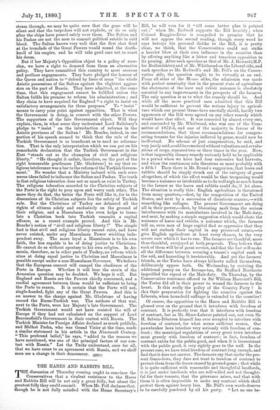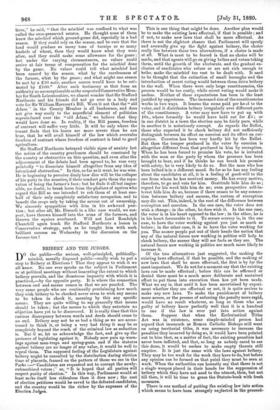THE HARES AND RABBITS BILL.
THE discussion of Thursday evening ought to convince the Conservatives that a virulent resistance to the Hares and Rabbits Bill will be not only a great folly, but about the greatest folly they could commit. When Mr. Pell declares that, though he is not fully satisfied with the Home Secretary's Bill, he will vote for it " till some better plan is pointed out ;" when Mr. Rodwell supports the Bill heartily • when Colonel Ruggles-Brise is compelled to promise that he will not oppose the second reading, though every word he says betrays his personal dislike to the Bill, it is pretty clear, we think, that the Conservatives could not strike a heavier blow at their own influence in the counties than by offering anything like a bitter and tenacious opposition to its passing. After such speeches as that of Mr. J. Howard (M.P. for Bedfordshire) and of Mr. Whitbread on the Liberal side, and such speeches as Mr. Rodwelrs and Mr. Pell's on the Conser- vative side, the question ought to be virtually at an end. From all sides of the House alike, the admission was made with perfect unanimity that in the present state of agriculture the abatement of the hare and rabbit nuisance is absolutely essential to any improvement in the prospects of the farmers. The only question is as to what the remedy should be. And while all the more practical men admitted that this Bill would be sufficient to prevent the serious injury to agricul- ture which our present Game-laws carefully shield, hardly two opponents of the Bill were agreed on any other remedy which would have that effect. It was conceded by almost every one, and contended by Mr. Whitbread, who was one of the Com- mittee of 1872-3, and one of the majority in favour of its recommendations, that those recommendations for compen- sating tenants for the injuries inflicted by game, would now be ineffectual. No scheme of just compensation, he said, and very justly said, could be conceived without valuations and revalu- ations of crops, repeated two or three times in the year. Now, is that impossibly clumsy remedy seriously held to be applicable to a period when we have had four successive bad harvests, and when the continuous rain threatens us most probably with a fifth ? Then there is Mr. Brand's suggestion, that hares and rabbits should be simply struck out of the category of game altogether, of which the effect would be that trespassing would become a nuisance so intolerable as to do well nigh as much harm to the farmer as the hares and rabbits could cdo, if let alone. The situation is really this : English agriculture is threatened from many quarters,—first, by the competition of the United States, and next by a succession of disastrous seasons,—with something like collapse. The present Government are doing all in their power,—first, by liberating malt from the serious interferences with its manufacture involved in the Malt-duty, and next, by making a simple suggestion which would abate the nuisance of hares and rabbits, a nuisance which, the farmers tell us, even men of large capital find so oppressive that they will not embark their capital in any preserved estate,—to give English agriculture at least every chance, in the very severe race which it has to run. The farmers are thankful, more than thankful, overjoyed at both proposals. They believe that each of them will be of great service, and that the last will make all the difference between securing a tenant's capital sunk in the soil, and hazarding it irretrievably. And yet the farmers' friends, as the Tories have always hitherto called themselves, deliberately oppose both. On Wednesday, by resisting the additional penny on the Income-tax, Sir Stafford Northcote imperilled the repeal of the Malt-duty. On Thursday, by the Conservative resistance offered to Sir William Harcourt's Bill, the Tories did all in their power to wound the farmers to the heart. Is this really the policy of the Country Party ? Is this their preparation for fighting the counties against the Liberals, when household suffrage is extended to the counties?
Of course, the opposition to the Hares and Rabbits Bill is glossed over on the ground that it interferes with freedom of contract. It is perfectly true that it interferes with freedom of contract, but as Mr. Shaw-Lefevre pointed out, not even Sir H. Selwin-Ibbetson himself has ever scrupled to interfere with freedom of contract, for what seems sufficient reason. Our pawnbroker laws interfere very seriously with freedom of con- tract ; the municipal regulations of every great toWn interfere most gravely with freedom of contract; in fact, freedom of contract exists for the public good, and when it is inconsistent with the public good. it very rightly goes to the wall. In the present case, we have tried freedom of contract long enough, and find that it does not answer. The farmers say that under the pre- sent Game-laws, they dare not trust to freedom of contract to protect them from the losses caused by ground-game; • that while it is quite sufficient with reasonable and thoughtful landlords, it is just under landlords who are self-willed and not thought,. ful for their tenants, that the grievance arises, and that with them it is often impossible to make any contract which shall protect them against heavy loss. Mr. Pell's own words deserve to be carefully pondered by all his party. "Let no one be-
lieve," he said, "that the mischief was confined to what was called the over-preserved estates. He thought none of them knew the mischief which ground-game did, especially in a bad season. If they could rely on the season, and be sure that the land would produce so many tons of turnips or so many bushels of wheat, then they would know what they were after, and they could make some allowance for the game ; but under the varying circumstances, no valuer could arrive at fair terms of compensation for the mischief done by the game. No valuer could tell what mischief had been caused by the season, what by the carelessness of the farmer, what by the game ; and what might one season be met by a £10 note, another season would have to be esti- mated by £100." After such testimony as that from an authority so unexceptionable as the respected Conservative Mem- ber for South Leicestershire, we almost wonder that Sir Stafford Northcote and his friends did not go over in a body and vote for Sir William Harcourt's Bill. Were it not that the "old Adam" in the County Member is all landowner, and does not give way easily to the superficial element of politician superinduced over the "old Adam," we believe that they would have done so. In reality, if the Bill passes, freedom of contract will suffer very little. It will be only where the tenant finds that his losses are more severe than he can bear, that he will avail himself of the law which overrules freedom of contract where freedom of contract is fatal to good agriculture. Sir Stafford Northcote betrayed visible signs of anxiety lest the action of the country gentlemen should be construed by the country as obstructive on this question, and even after the adjournment of the debate had been agreed to, he rose very pointedly "to dissociate himself altogether from any idea of intentional obstruction." In this, so far as it went, he was wise. He is beginning to perceive dimly how dire will be the collapse of his party in the counties, if their conduct gets them the repu- tation of being the farmer's foes; but he finds it all but impos- sible, no doubt, to break loose from the phalanx of squires who regard this Bill as one intended to rob them of at least one- 'half of their only completely satisfactory occupation, and to 'benefit the crops only by taking the savour out of ownership. We sincerely sympathise with him in his awkward posi- tion; but after all, Mr. Disraeli in a like case would, we sus- pect, have thrown himself into the arms of the farmers, and thrown the squires overboard. Will not Lord Randolph Churchill again teach Sir Stafford Northcote a lesson in Conservative strategy, such as he taught him with such brilliant success on Wednesday in the discussion on the Income-tax?



































 Previous page
Previous page